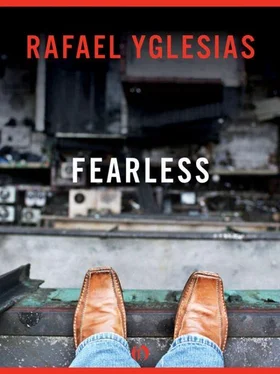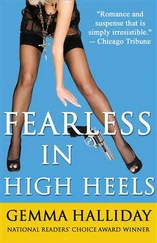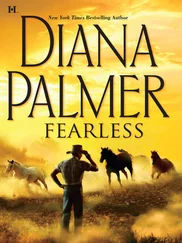“What is it?” Ginny grabbed Carla’s hand. Monsignor O’Boyle had regained his balance, let go of the boy, and resumed the ritual. He lifted the blood of Christ in the air. Didn’t matter. Carla was terrified that the priest would fall again. She couldn’t watch him. She was convinced he was about to topple and crack his head on the stone floor. She imagined the watery blue eyes staring lifelessly into the dark of the ceiling, his skinny old body crumpled and twisted on the strip of red carpet.
“I’m sorry,” she apologized to Ginny. A pair of old widows shot them dirty looks for talking. “I got to go,” she said and despite the rude noise and the sacrilege, she left in the middle of Monsignor O’Boyle’s ghostly ceremony. She was trembling when they got outside.
“You cold, hon?” Ginny asked. It was November and very cold that day. There were white streaks in the gutter where the freezing wind had drained its black blood. “It was cold in there. I forgot how cold that fucking Old Saint Pat’s is.” Ginny was pious and went to church even during her druggy teenage years, but she always cursed when she talked about Old St. Pat’s.
“He missed a step,” Carla tried to explain. “He almost fell.”
“Yeah, he drank too much of the blood of Christ,” Ginny said.
Carla didn’t explain to her friend why the priest’s misstep terrified her. Ginny would be disgusted by her nutty cowardice. She was sure that Monsignor O’Boyle would have died if he had fallen. She couldn’t get rid of the picture of him killed: eyes swollen and unmoving; the look of the dead on the plane. She shivered all the way home. Ginny brewed a burning-hot cup of espresso. Carla gulped it down and yet still trembled.
They sat in the kitchen and talked. That was awkward. Carla felt Ginny wanted to tell stories about her kids. She would start to, then become self-conscious and change subjects.
“Talk about your kids,” Carla finally said.
“I don’t want to talk about them. What for? I’m so glad to have a day off. They make me crazy.”
But she was lying and that made it worse. “The kids with John today?” Carla prompted her.
“John? You crazy? Take care of his beloved children? Nah — they’re with John’s mother.”
“They get along with her?”
“You kidding? They love her. Not like my mother. She worries about her furniture. I say to her, ‘They’re your grandchildren. Enjoy them. You’re going to be dead soon. What do you want to be surrounded by in your last years? Your beautiful grandchildren or clean upholstery?’ You know what she said?”
“Clean upholstery,” Carla answered.
Ginny threw her head back and laughed. “You’re right.”
“Your mama loves her furniture,” Carla said. “Sometimes she’d look at your pop eating — you know how sloppy he was? Sometimes she’d look at him like she wanted to put a Hefty bag under him, tie it up and put him out with the night’s garbage.”
Ginny roared. She laughed easily and often. She was happy. She had always been a plump, short girl with chubby arms and legs, strong but not fat. Childbirth hadn’t enlarged her and yet Ginny looked stronger. Her biceps bulged like a workman’s. Maybe she carried both kids all day. Outside the cathedral Carla had put her arm through Ginny’s. The muscles were strong ropes, like Manny’s, the arms of people who worked hard.
“Your kids must keep you running around.”
Ginny made a whooshing noise. “All day. No stopping. Noise all the time. I’m exhausted.” But she wasn’t. She sat on the edge of the metal chair, ready to answer any request, happy to be needed.
Carla felt glad for a moment. She hadn’t wanted to think about Ginny’s children before, but her girlfriend’s obvious pleasure in life made Carla feel a little easier about her own loss — simply because it meant there was happiness somewhere. Carla decided to ask the question about Ginny’s life that she had always been too scared to ask. She had to know urgently — it was the danger to Ginny’s light heartedness: “Is John in the Mafia?”
“I hope so,” Ginny answered without hesitation. “I don’t want to be married to a free-lancer.”
“You’re funny,” Carla said, unable to laugh, but knowing that if she weren’t so numb she would.
“I’m funny? You’re the funny one, Carly. Remember when you used to do imitations? Remember at my big brother’s wedding you made me laugh so hard I had to go to the bathroom?”
Carla used to do imitations of the nuns at school and the tough boys strutting their stuff at San Gennaro. From Ginny’s memory she received an image of herself the way she used to be before the crash: mischievous and fun and…not scared. “I didn’t have a care in the world,” she said wonderingly and stared into her friend’s eyes.
Tears filled them. Ginny said, “Oh hon,” with a sob. She lurched out of the kitchen chair awkwardly to hug Carla. “I’m sorry,” she squeezed Carla with her strong arms. “I’m so sorry, hon.”
Carla didn’t feel bad. She patted her friend’s back comfortingly. “I didn’t have a care,” she mumbled, thinking about the words, the trick in the switch of meaning: “I was careless,” she said and held her breath waiting for Ginny’s reaction to her confession. But Ginny didn’t hear Carla. Her strong friend was crying too hard.
Manny drove her to the group meeting of survivors. He parked his illegitimate father’s car in the Sheraton’s lot. It was full. He shut off the engine. Carla glanced at the people gathered by the double glass doors to the lobby. She didn’t recognize anyone. There were many people and they appeared comfortable with each other. She saw a man and a woman coming from opposite sides of the parking lot embrace without even bothering to say hello.
“I can’t go,” she mumbled. Her head drooped and she stared into her lap. She had dressed up for Dr. Perlman’s group session. She wore the blue-and-white-print dress she had bought for her mother’s wedding. Ginny had taken her to the beauty parlor and insisted Carla let them shape her wild black hair. With it restrained, and wearing a dress, Carla felt young and little. She was as timid with the group as a new kid on the first day of school.
Come on, Carla , she told herself. It’ll help you . She couldn’t answer the encouragement.
“Babe, I’ll go in with you.” Manny rubbed her arm. “We drove all the way here. Just go in for a little bit. See what it’s like.”
Actually it hadn’t been a long drive. The hotel — Manny said they were supposed to go to a meeting room — was on the other side of the Holland Tunnel in Jersey City. Carla wished it had taken longer. “I can’t,” she said. Her fingers slid on her palms — they were wet with fear.
“I ain’t going back home, Carly.” Manny’s tone was hard. “We’ll sit in this fucking car forever. I don’t give a shit. You can’t go on like this. It’s been four months! You don’t do anything. We don’t fuck anymore—”
“We do too,” Carla complained.
“That’s not the real thing. You lay there staring at me like a fish.” Manny leaned his head on the steering wheel. “I’m sorry,” he groaned. “Go!” He shouted into the gap of the wheel. “I can’t help you. Your mother can’t help you. The priests can’t help you. You gotta fucking go.” He shut his eyes against tears and closed his mouth to stop the flow of anger.
She was alone. She had never, ever, been so alone. That was the truth. She pulled at the door handle and it sagged heavily out and away, swaying low until it scraped the pavement. She heard the traffic of slow-moving cars edging toward the tunnel. Put your feet out , she told herself. She slung one, heavy and lifeless, onto the concrete.
Читать дальше












